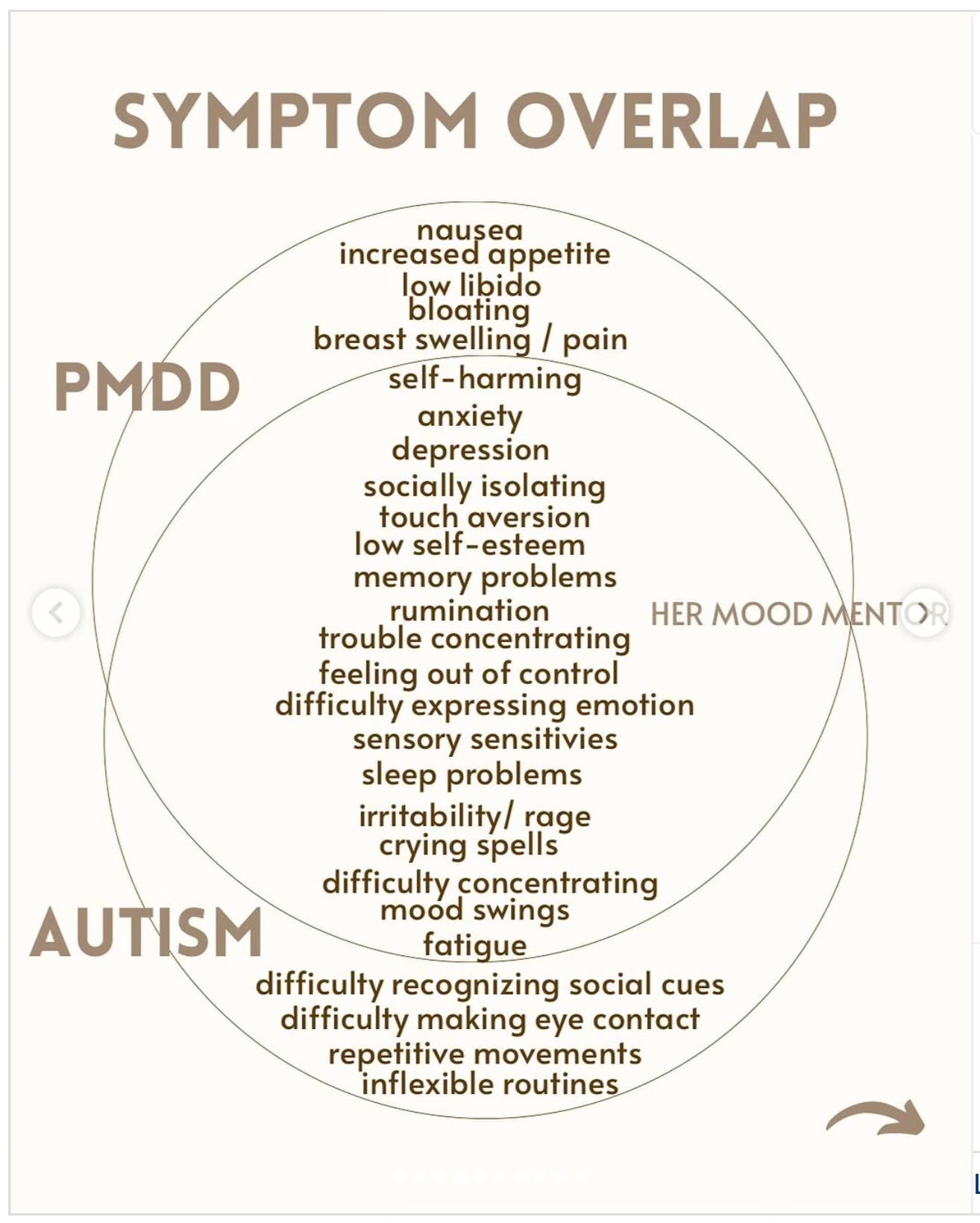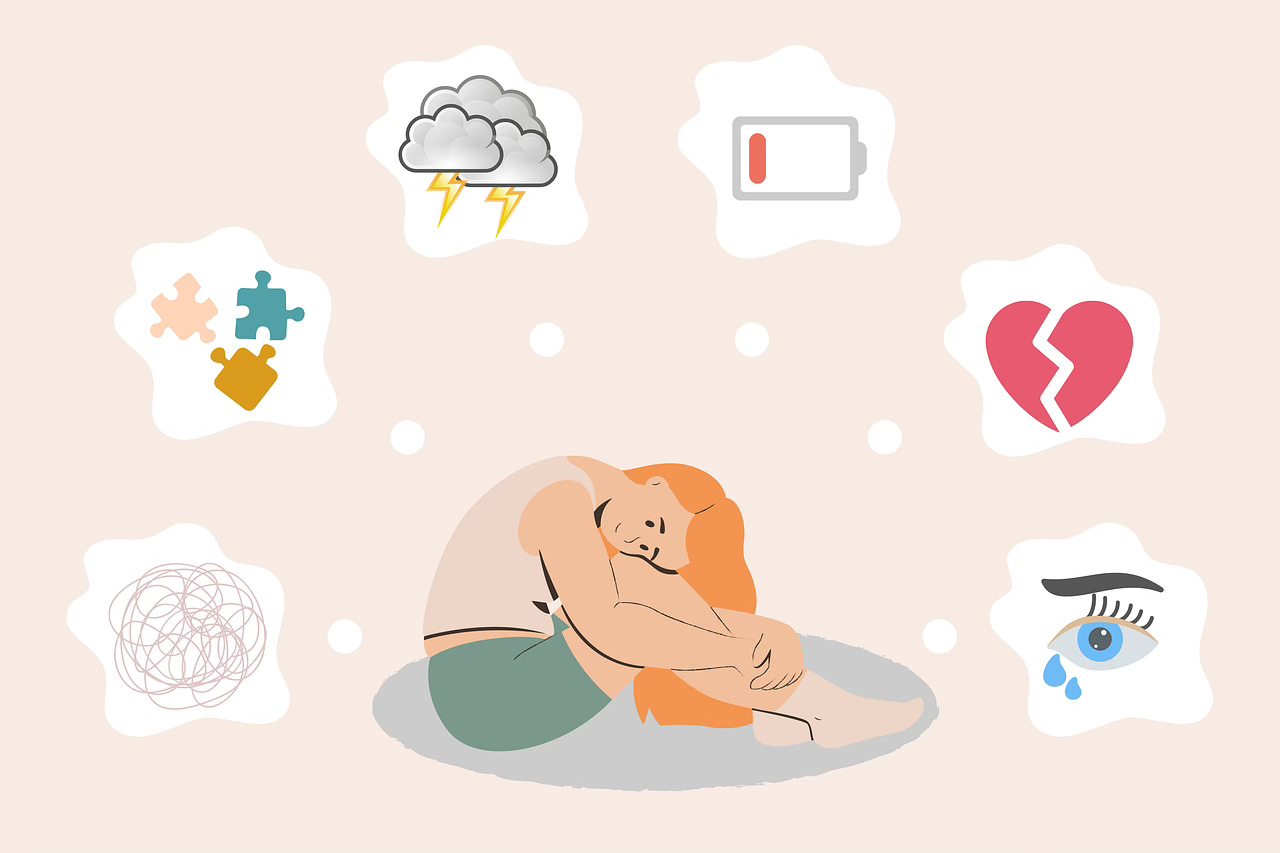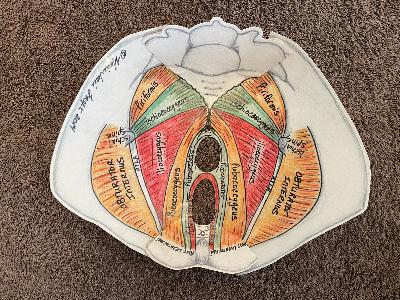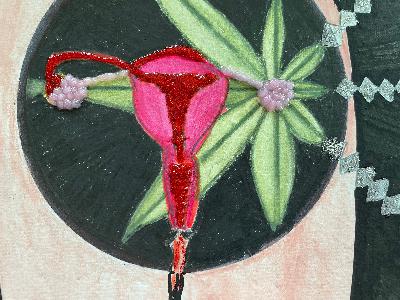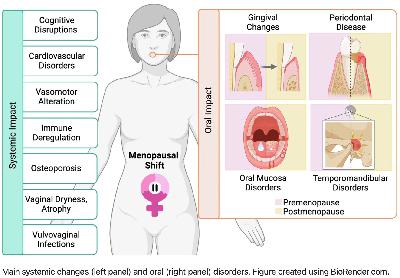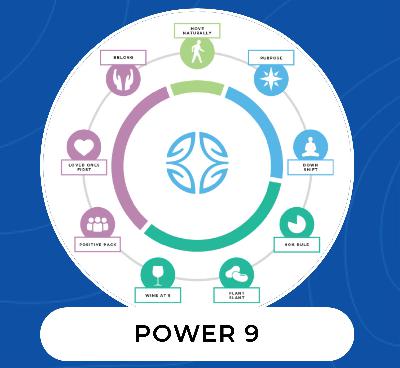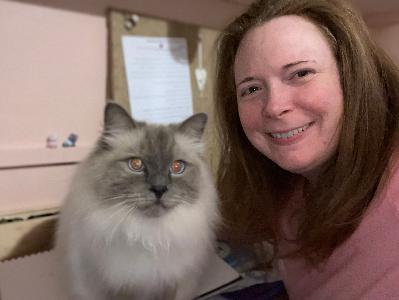Why PMDD Worsens During Neurodivergent Perimenopause
Description
Hello!
If you are new here, welcome to The Autistic Perimenopause: A Temporary Regression!
I am Sam - a late diagnosed neurodivergent woman, a tenacious midlife struggler, and an advocate for people in autistic perimenopause.
Today I am deep in the midst of neurodivergent perimenopausal misery, so let’s see if I can put words in an order that conveys anything of interest and/or that makes sense… 🤞
This week I have spent one million hours researching, writing and editing this and other upcoming posts. Your support allows me to keep this community thriving.
April is Premenstrual Dysphoric Disorder (PMDD) Awareness Month, as well as Autism Awareness Month. Yippee! 🎉
Geopolitically, the awareness drive doesn’t seem to be hitting the mark, with those in power denying us any sort of respect or rights. But let’s pop that aside for now and imagine we are receiving the support and respect we deserve for being the differently wired legends that we know we are.
💕
What is PMDD?
Premenstrual dysphoric disorder is a cyclical, hormone-based disorder that impacts approximately 1 in 20 reproductive-age women who were assigned female at birth. The condition is often underdiagnosed, misdiagnosed or dismissed entirely by medical professionals, despite patient reports of debilitating anxiety, hopelessness and a variety of physical symptoms in the two weeks before menses.
UIC Today: Suicidal thoughts, behaviors linked to hormone-sensitive brain disorder
I know, I am sorry.
As it was for me, so may it be for you: yet another co-occurring condition we can enjoy adding to the alphabet soup of diagnoses we are gaining in neurodivergent midlife.
PMDD can be another great too-late explainer of why everything has been so s**t for those of us being destroyed by our menstrual cycles for decades. Yay. But contextualising past (and, in my case, current) hell is a winner, right?
So, yes, PMDD is an actual “mental health disorder” and validates why many of us have felt beyond awful on a cyclical basis.
Yet with no perception of time and as a lifelong time agnostic (thanks, ADHD!), it is unfortunate that tracking symptoms and noticing patterns over time is not a strength of mine.
Whilst I can think back to the overflowing catalogue of times when former friends and ex partners have told me I am a “crazy b***h”, I wouldn’t pick up on that being, for example, the third week of every four week cycle.
PMDD is not a hormonal imbalance. The hormone levels are not the issue, rather those of us with PMDD are neurobiologically sensitive to the fluctuations of oestrogen and progesterone levels through a normal and natural menstrual cycle.
NB: I am so exhausted by PMDD and all the other midlife BS right now that I am not coping with, that I am struggling to figure out when to use the words “period”, “cycle” and “episode” in the correct context. And all this whilst my teen is sitting beside me as I write telling me about Fortnite…
Here is a very short podcast episode from The International Association for Premenstrual Disorders and provides a succinct explanation of PMDD:
In order for me not to provide you with the wrong information, let’s hand this over to the Diagnostic and Statistical Manual of Mental Disorders, Fifth Edition.
I don’t know about you, but I cannot process that text right now. Therefore, full disclosure, I have asked ChatGPT to summarise this for an autistic audience in an easy-read style:
⬇️
✅ To have PMDD, these things must happen:
🌸 What is Premenstrual Dysphoric Disorder (PMDD)?
PMDD is a serious health condition that affects some people before their period (menstrual cycle). It causes strong feelings and body changes.
✅ To have PMDD, these things must happen:
1. Timing of Symptoms
* You must have at least 5 symptoms in the week before your period starts.
* The symptoms:
* Start before your period,
* Get better a few days after your period starts,
* Are mostly gone in the week after your period ends.
2. At Least 1 Strong Feeling Symptom (Pick from this list):
You must have one or more of these:
* Mood swings (feeling very happy then very sad quickly)
* Feeling angry or annoyed easily
* Feeling very sad or hopeless
* Feeling nervous, worried, or on edge
3. Other Symptoms (To make a total of 5 symptoms)
You also need more symptoms from this list:
* Not enjoying things you usually like (e.g. friends, hobbies)
* Trouble focusing or thinking
* Feeling very tired or no energy
* Eating a lot, or craving certain foods
* Sleeping too much or not enough
* Feeling overwhelmed or out of control
* Body problems like:
* Breast pain or swelling
* Muscle or joint pain
* Feeling bloated
* Gaining weight
4. How it Affects Your Life
* The symptoms make it hard to do normal things like:
* Going to school or work
* Being with friends or family
5. Other Health Conditions
* PMDD symptoms should not just be part of another condition (like depression or anxiety), but PMDD can happen at the same time as other conditions.
6. Keeping Track
* Doctors should look at your symptoms for at least 2 periods in a row to be sure.
7. Not Caused by Something Else
* The symptoms are not caused by:
* Drugs or alcohol
* Medication
* Another illness (like a thyroid problem)
(Sam) Then I asked ChatGPT for a diagram to support the visual processors amongst us 🙋♀️
⬇️
⬇️
Sam to ChatGPT:
⬇️
(Sam) ChatGPT could not fulfil this request, so let’s not get too worried about AI coming over here and taking our jobs and our women just yet.
*** END OF CHATGPT AND AI USE IN THIS POST *** (apart from the transcript from my audio voiceover that Substack tech will hopefully write up for me later)
💕
Why do I need to know if I have PMDD?
Increased risk of suicidality is associated with PMDD, and that is why I want you to know about it. It is also more prevalent in the neurodivergent population, which I doubt will shock you.
It is tricky, as it can take decades before we realise this chronic mental health condition affects us. I was diagnosed with it retrospectively after unwittingly undergoing the third line treatment for this little known debilitating mental health condition.
Before I knew I had PMDD, I heavily masked my cyclical breakdowns, took a lot of time off work (I was a teacher in my 20s), binge ate chocolate, then manically exercised to compensate for it. I lost close friendships, stormed out of the house with no plan where to go and not knowing why I had put myself in that vulnerable position. I drove dangerously, and leaned into impulsivity. I raged and had intense meltdowns, smashing things a la Fern Brady in her autistic memoir, ‘Strong Female Character’.
Whilst it is helpful to know now that I was a PMDD sufferer, I would have found greater benefit in that diagnosis decades ago. I could have planned my life accordingly. I masked to an exhausting extent, and made up for my self-destructive PMDD one-week-in-four episodes by pushing myself beyond my limits my three “good” weeks per menstrual cycle.
Putting all my energy into hiding and excusing this “mental disorder” each month left me exhausted and susceptible to cyclical undiagnosed autistic burnout. So now I know that understanding myself sets me up to be more aware of potential challenges, and kinder to myself when they are genuinely insurmountable.
People diagnosed with PMDD these days are able to request reasonable accommodations at school, at home and at work.
In the laughably entitled podcast The Happy Menopause, interviewee and PMDD survivor, lecturer and researcher, Dr. Lynsay Matthews, states that PMDD sufferers may describe their episodes as:
* spiralling
* unravelling
* out of control.
And they may identify these patterns in line with the luteal phase (post-ovulation to your bleed, average days 14-28 of the menstrual cycle):
* cyclical relationship crises (splitting up with your partner every month, losing friendships etc.)
* cyclical addiction crises (patterns of alcohol or drug misuse, associated driving under the influence offences etc.)
* cyclical psychosis crises (I don’t have examples of this but I am wondering about the misdiagnoses of Bipolar Disorder and/or Borderline Personality Disorder that so many menstruating autistics and ADHDers receive..?)
💕
Australia-based UK-trained GP with an interest in women’s hormonal health, who was interviewed on the Sexy Ageing podcast, Dr. Ceri Cashell, says:
“Life’s short. You don’t know what’s around the corner, so to lose half or a quarter of your life due to these (PMDD) symptoms is horrific.”
How do I know if I have PMDD?
IAPMD provides an online self-screening tool that is not intended to be

